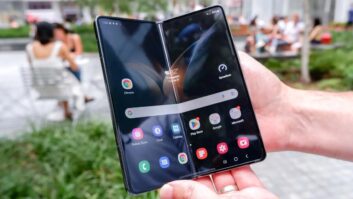NEW ORLEANS –
The leaders of the nation’s four
largest wireless carriers took to the stage here at
CTIA Wireless 2012 to promote agendas ranging
from an urgent need for more wireless spectrum
to a need to rehabilitate the industry’s reputation
among consumers.
During their shared keynote session, some of the
executives also pointed to a need for carriers to offer
creative services to consumers, not just fast network
speeds.
Innovation and industry growth are “at risk due
to the spectrum shortage,” said Verizon Wireless
president/CEO Dan Mead during the keynote session.
The Federal Communications Commission
has forecast that wireless data demand would be
25 to 50 times greater in 2015 compared with
2010, and that if no more spectrum is made available
to carriers in the near term, data demand would
likely exceed capacity in 2014, Mead said.
Because it would be “some years” before new
spectrum would be ready for carriers to use, Verizon
needs additional spectrum in some markets
by 2013 and in other markets by 2015, Mead said.
For that reason, Verizon is seeking to buy unused
AWS-band spectrum from cable companies and is
confident the government will approve the deal in
midsummer, he said.
For his part, T-Mobile USA president/
CEO Philipp Humm called the need for
new spectrum “urgent” because it takes
a while for the government to auction
off spectrum and for carriers to put it to
use. In 2009, he noted, T-Mobile smartphone
customers used an average of
25MB of data per month, and in 2012
that jumped to 760MB per month. The
main culprit is video, Humm said. Video
accounts for about half of data usage
on 4G networks, and “mainstream”
consumers are just starting to become
aware of video over cellular, he said.
While waiting for new spectrum, carriers
are moving to make their networks
more efficient, Humm said. In the future,
he forecast the ability to dynamically
adjust network capacity as needed and
implement small-cell technology that,
for now, is still costly and complex.
Although more spectrum is needed,
Sprint Nextel CEO Dan Hesse said the
industry faces another challenge: rehabilitating
its reputation. The industry is
suffering from “a trust and reputation
crisis” as evidenced by a survey that
found the industry’s reputation to be
the lowest of any major industry, including
the cable and oil industries, Hesse
said. He cited a survey by the Reputation
Institute, a reputation management
consultancy.
Safety, security and privacy issues
and how the industry addresses them
affect the industry’s reputation and its
future fortunes, he said. “If they trust us,
they will buy from us.”
For that reason, Sprint is taking multiple
initiatives, including working with
Norton and McAfee to address growing
consumer concerns about hacking and
viruses, Hesse said. The carrier will also
provide consumers with privacy choices,
giving users control over such things
as sharing information for mobile advertising.
Sprint will use an independent
auditing company to verify the company
is adhering to consumers’ privacy settings,
he noted.
Hesse also announced new Sprint
Guardian services, due in the summer
on multiple Android handsets. Users will
be able to download a suite of subscription-
based apps that protect multiple
wireless devices from theft, loss and
malware and protect family members.
To protect families, the suite include
the carrier’s Family Locator service and
ability to limit a child’s texting while driving
or at school.
Consumers will be more focused on
privacy, safety and security than they will
be on network speed, Hesse claimed.
Despite the industry’s bad reputation,
Hesse said he doesn’t believe the rap
is deserved and suggested the industry
has to market itself better. “I am surprised
… but the data is there,” he said.
Hesse didn’t explicitly link the industry’s
reputation problem to carriers that
have taken “creative license with the
digit four” to promote their services as
4G, but he did say that consumers are
“confused by what 4G LTE means.”
For his part, Ralph de la Vega president/
CEO of AT&T Mobility dedicated
most of his keynote comments to pointing
out that “consumers want more than
just speed” from carriers. Carriers must
develop services that make consumers’
lives “fuller and richer,” he said One
such service is AT&T’s planned Digital
Life home security, remote monitoring
and home-automation system, he said.
Likewise, T-Mobile’s Humm said he
sees carriers shifting from being wireless
access providers to offering valueadded
services as voice and text revenues
decline.
In comments made under questioning
from CNBC “Mad Money” host Jim
Kramer, the executives expressed their
opinions on whether certain technology
companies were their friends or foes.
AT&T’s de la Vega called Apple a friend
despite high subsidy costs because
the phone helped increase the carrier’s
margins and lower its churn rate. Hesse
called Skype a friend even though it offers
free voice and messaging services
because consumers must pay for Sprint
data service to use Skype. “A bit is a
bit,” he said.













